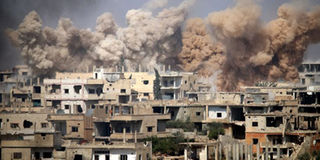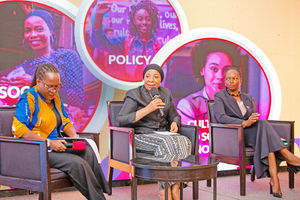Who's who in the Syria conflict

Syria's war has killed more than 320,000 people ,PHOTO/AFP
What you need to know:
Here is a breakdown of the forces involved in the war, which has killed more than 340,000 people:
Beirut, Lebanon | AFP | Syria's war has spiralled into a complex multi-sided conflict since it began with anti-government protests in March 2011, drawing in regional and international powers including the United States and Russia.
Here is a breakdown of the forces involved in the war, which has killed more than 340,000 people:
- Regime and allies -
Syria's 300,000-strong pre-war army has been halved by deaths, defections and draft-dodging.
It is bolstered by up to 200,000 irregulars and as many as 8,000 men from Lebanon's Shiite Hezbollah movement as well as by Iranian, Iraqi and Afghan fighters.
Regime backer Russia launched an air campaign in support of President Bashar al-Assad in September 2015, helping Damascus recapture key areas including second city Aleppo.
In late November, Moscow said it would be scaling back its military presence by the end of 2017.
Iran has also given Assad major financial and military support.
The Syrian government now holds 55 percent of the country, including major cities Damascus, Aleppo, Homs and Hama, and around two-thirds of the population lives in regime-held areas.
- Rebels -
Syria's opposition comprises multiple factions including moderate rebels and Islamist groups, but it has shrunk from estimates of up to 100,000 fighters as the government has retaken territory.
Early in the uprising, rebels coalesced under the banner of the Free Syrian Army (FSA), but the opposition has since splintered.
The once powerful Ahrar al-Sham, a hardline Islamist group, was in July ousted from most of its strongholds in Idlib province by a jihadist coalition led by their former ally Tahrir al-Sham.
Another leading Islamist rebel group, Jaish al-Islam (Army of Islam), is active around Damascus.
Rebels who once controlled large areas now hold only around 12 percent of the country, according to Syrian geography expert Fabrice Balanche.
That includes areas now held by the jihadist Hayat Tahrir al-Sham, a coalition essentially composed of Al-Qaeda's former affiliate.
Around 15 percent of Syria's population lives in rebel-held territory.
- Jihadists -
Two major rival jihadist forces operate in Syria: the Islamic State group and former Al-Qaeda affiliate, Fateh al-Sham Front.
IS emerged from wars in Syria and Iraq to seize swathes of both countries in mid-2014.
It declared an Islamic "caliphate", committed widespread atrocities and carried out or inspired deadly attacks around the world.
Since then, IS has suffered major losses under pressure from a US-backed alliance of Kurdish and Arab fighters, as well as Russian-backed regime offensives.
The group has been ousted from its former de facto Syrian capital Raqa and now holds just five percent of Syria.
Fateh al-Sham Front split in July 2016 from Al-Qaeda and later formed the Hayat Tahrir al-Sham jihadist coalition that controls most of Idlib.
- The Kurds -
Syria's Kurds have largely avoided the conflict between the government and armed opposition, carving out a semi-autonomous region in northern and northeastern Syria.
Their People's Protection Units (YPG) militia became a key partner of the US-led coalition fighting IS and forms the backbone of the SDF, an alliance of Kurdish and Arab fighters.
The YPG controls nearly 30 percent of Syrian territory, including some three-quarters of the northern border with Turkey.
Around 15 percent of Syria's population lives under Kurdish rule.
- Turkey, Saudi Arabia, Qatar -
Sunni-majority Saudi Arabia, Qatar and Turkey have provided military and financial support to rebels fighting Assad, who belongs to the minority Alawite sect linked to Shiite Islam.
Today, Riyadh and Doha's roles have been reduced, with Turkey taking the lead as international supporter of the opposition in negotiations on ending the conflict.
Along with Iran, Ankara and Moscow have worked closely in recent months to implement four "de-escalation zones" around the country, and the three countries are also planning a "congress" of opposition and government forces in Sochi.
On the ground, Turkey has battled both IS and Kurdish forces it accuses of being "terrorists". It is also present in Idlib, monitoring the "de-escalation zone" there.
- International coalition -
A US-led coalition has targeted IS and other jihadists in Syria with air strikes since 2014.
The coalition includes Britain, France, Saudi Arabia and Turkey along with Australia, Bahrain, Canada, Jordan, the Netherlands and the United Arab Emirates.
It was a key backer of the SDF advance on Raqa, and is supporting the militia in an operation against IS in neighbouring Deir Ezzor province.
Since Raqa's capture, coalition strikes have dropped off drastically and Turkey says Washington has vowed to halt its supply of arms to the YPG, but US officials have said coalition forces do not expect to end their mission until a peace deal is negotiated.




